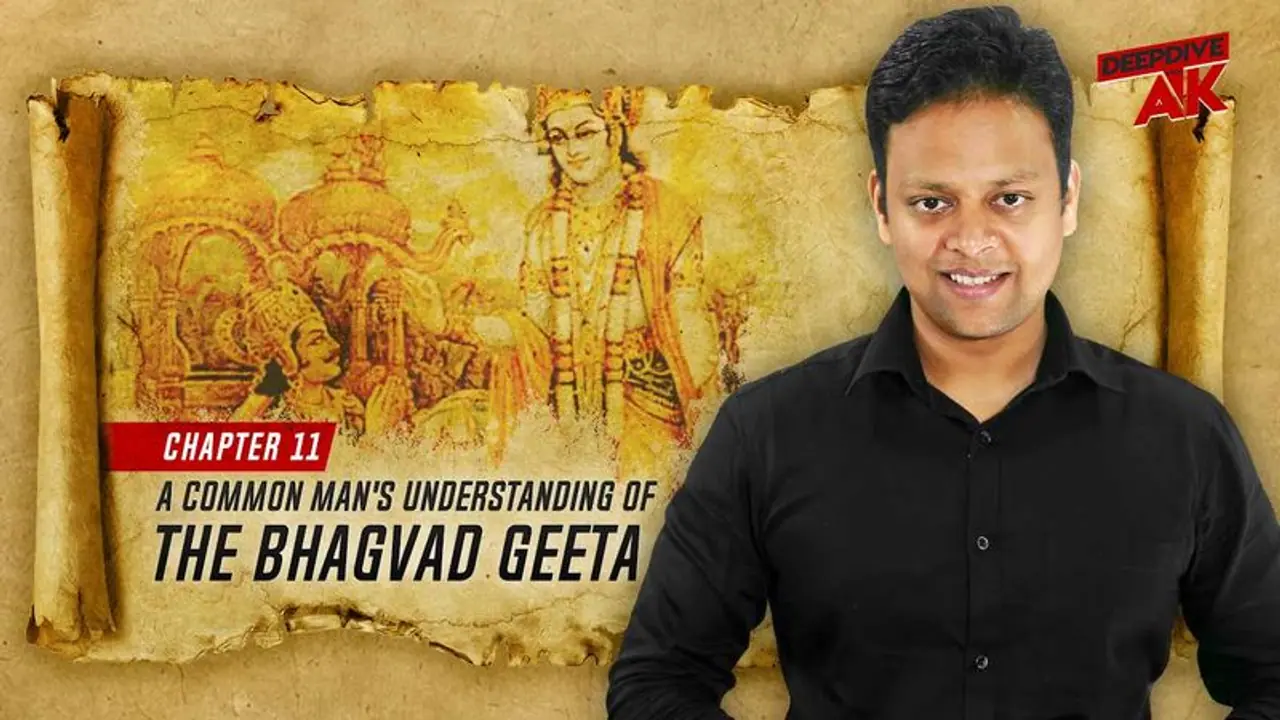Abhinav Khare deep dives into the eleventh chapter of the Bhagvad Geeta where Krishna gives Arjuna a glimpse of the incredible vastness and majesty he encompasses, showing him the "whole universe/enfolded in the body of the God of gods”
Finally understanding much of what Krishna is trying to impart, Arjuna asks Krishna to show him his "ultimate form”. In the words of the poet, Sanjaya, Krishna gives Arjuna a glimpse of the incredible vastness and majesty he encompasses, showing him the "whole universe/enfolded in the body of the God of gods”. The vision is also a terrifying one, as Krishna reveals a self with billions of heads, fangs, and weapons. Arjuna is humbled and awed by the vision. He describes what he sees, including a vision of Krishna devouring all of the Kauravas. Arjuna asks Krishna, "Who are you, in this terrifying form?" Krishna responds that he is death and that Arjuna must fight in the battle because the Kauravas will die regardless. Krishna has already killed them; Arjuna is merely his instrument. Arjuna bows to Krishna and apologises for any overfamiliarity he might have shown. Now that he sees this terrifying form of Krishna, Arjuna is both amazed and afraid. He begs Krishna to return to his previous, more human form. Krishna explains he has shown his "horrific" form to no one but Arjuna. He gently admonishes him, telling him not to be afraid but to stay serene and lighthearted.
Analysis:
Chapter 11 contains more action than previous chapters. Instead of revolving primarily around the dialogue between Krishna and Arjuna, it describes a scene in which Krishna transforms into a more divine manifestation and shows Arjuna some of his power. What dialogue might not have been communicated fully until now is escalated by the visual experience of Krishna's divine form revealing the nature of the being to whom Arjuna is talking. Arjuna's response is a mixture of awe, love, and fear because he has moved from an intellectual to an experiential understanding of Krishna's teaching. However, even this form of Krishna doesn't fully encompass his unmanifest form. Although it allows Arjuna a more tangible grasp of Krishna's vastness, Krishna's unmanifest form is impossible to experience outside of actually achieving union with God. Readers should keep in mind, however, that the transformation is seen and told from the perspective of the poet Sanjaya.
Several important Gods are mentioned in the poem and throughout this chapter. First, Brahma appears in this chapter in conjunction with his "lotus throne”. Often depicted as seated in a giant lotus flower, he is one of the three Gods connected to the creation, sustainment, and destruction/transformation of the universe. Brahma is the god of creation, Vishnu is the god of sustainment, and Shiva is the god of destruction and rebirth. In this chapter, Arjuna calls Krishna "Lord Vishnu" multiple times. Because Krishna is often interpreted as an incarnation of Lord Vishnu, or vice versa, they are usually recognised as versions of the same deity.
About Abhinav Khare:
Abhinav Khare is the CEO of AsiaNetNews Network and also the host of a daily show named Deep Dive with AK. He has a lifetime collection of books and gadgets and has already pinged more than hundred cities around the globe.
He is a tech entrepreneur, who is passionate about policy, technology, economy and philosophy from ancient India. He earned an MS Engineering from the ETH Zurich and an MBA Finance from the London Business School.
